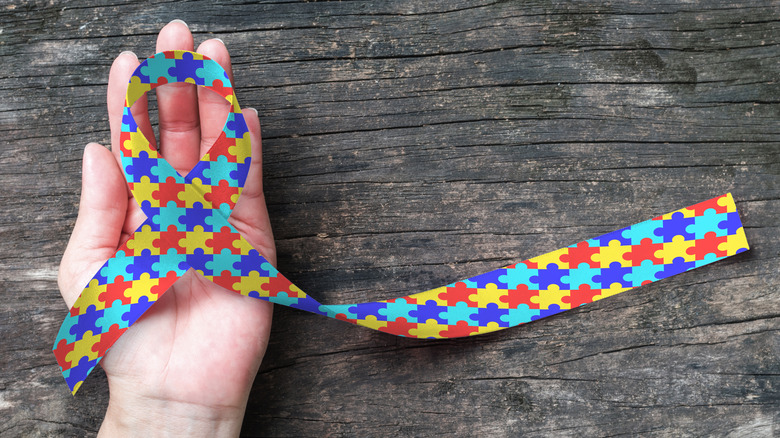Things Your Pediatrician May Not Know About Your Toddler
I'm just going to put it out there. I absolutely adore our pediatrician. He is kind, patient, and always reminds me that I'm doing a better job at this parenting thing than I thought. But as much as I respect and appreciate him, he can't do it all alone.
Our kids are amazing, complicated creatures, and our pediatricians simply cannot detect and manage every single change that comes up. For many conditions, pediatricians rely on the expertise of pediatric specialists or observations of parents to get the whole picture. Here are just a few of the areas where your pediatrician needs your eyes and ears to help take the best care of your child.
The best ways to support breastfeeding
Breastfeeding your baby sounds like one of the most natural things you could ever do. However, getting the hang of it can feel like anything but natural. Having a successful breastfeeding experience requires skilled support from those around you, and while your pediatrician can help determine if your baby is receiving enough milk, there are more specialized providers who can better support you.
"Generally speaking, pediatricians get little to no training in breastfeeding and even appropriate infant feeding for all babies," private lactation consultant Leigh Anne O'Connor told me. "Many babies with feeding issues are literally tongue tied, and there is often denial about this condition in the medical world." If you have questions about breastfeeding, talk with your pediatrician about connecting with a certified lactation consultant.
Screening for vision problems
According to the American Optometric Association (AOA), pediatric eye health is a significant public health concern these days. Far too many children are not being diagnosed with their vision problems, something we all need to be aware of. Pediatricians alone cannot be responsible, because these vision problems are more common than you'd think. One in five children in preschool has vision problems. One in four school-age children wear glasses or need some kind of corrective eye wear.
"If you can catch certain eye conditions and diseases early, in the course of their lives, you can really change children's lives," Diane Adamczyk, O.D. said in a press release, on the AOA's site. "If a child isn't functioning well visually, it can impact his or her performance in school. It can impact his or her behavior, future goals, and the kind of work he or she will do as an adult."
The association recommends all children receive an annual in-person eye exam. "What becomes critically important in children is the impact eye care and vision health can have on how well they function in their lives," Dr. Adamczyk, explained. "If this guideline heightens the awareness of getting children's eyes checked, we've accomplished our purpose." Be on the lookout for any vision problems in your child and always discuss any concerns with your pediatrician and optometrist.
If the sweating is normal
Have you ever noticed that little kids are always sweaty? They never stop moving, so it makes sense, but how can you tell if the sweating has surpassed normal kid excitement and crossed over into an actual chronic condition? Surprisingly, many children suffer from excessive sweating, and the diagnosis is often overlooked. About 2.1 percent of American children (over one million kids) experience excessive sweating or hyperhidrosis. That is no small number, so it's crucial for us as parents to be on the lookout and report any unusual or new symptoms to our child's pediatrician.
According to the International Hyperhidrosis Society (IHS), hyperhidrosis is the skin condition most likely to affect our quality of life. Because of this, treatment can significantly increase quality of life. "When hyperhidrosis is caught early," Dr. David Pariser told the IHS, "The life of a young person can be literally changed." The sooner you bring the issue to your doctor, the sooner your child can start feeling better.
If your picky eater is normal
As the parent to two little ones, I can attest to how frustrating picky eating is. Some days corn is okay, others, it's not. No two foods can be touching each other. Oh, and of course green vegetables are unacceptable. However, I have trouble deciding if this pickiness is just a normal phase or something that needs to be addressed.
"Parents want to know exactly what they need to do, but often get only general information rather than do-able, practical tips," pediatric speech language pathologist, feeding specialist, and co-author of Raising a Healthy Happy Eater, Melanie Potock, told me. "The common advice is 'He'll grow out of it!' but studies show that's not often the case. Research shows that at least one in four children will develop a feeding disorder (not an eating disorder) where their parents end up struggling and worried about their child's nutritional health."
If you are concerned, a referral to a feeding specialist could help. "Early intervention and parent education is key to ensure that kids don't end up in the chicken nugget rut. In fact, CBS News just reported that a recent study found that American toddlers are more likely to eat French fries than green vegetables on any given day," explained Potock. "In contrast, the American Academy of Pediatrics recommends serving vegetables at every meal, but specifics on how to do that are rarely offered to parents from pediatricians."
How to manage behavioral problems
If you've had concerns about your child's behavior, your pediatrician is a great place to start. Pediatricians are trained in recognizing behavioral issues, but treating them is another story. Many pediatricians don't feel that they have the time or expertise to manage the medications required for certain behavioral problems.
"Pediatricians need more education in managing the medications patients take for behavioral and attention issues," Pediatrician S. Daniel Ganjian told me. "Often times, they will refer patients to a developmental pediatrician or psychiatrist."
How to address obesity
Pediatric obesity is not a new concept, but it is still a challenge to treat. Just bringing up the subject to parents can be tricky. That is why pediatricians need a dedicated team to assist them. "I work with a lot of pediatricians, and I think they are lovely and so knowledgeable," pediatric dietitian Pegah Jalali told me. "I do think that most doctors do not learn enough about nutrition in medical school. I believe strongly in interdisciplinary health care, and that you need physicians, dietitians, social workers, physical therapists, and nurses to work together."
While your physician may be the one to recognize the problem, she will need the support of a team to develop a treatment plan. "I always think of the pediatricians as the captain of the ship, but if the pediatrician recognizes a problem which they are unable to treat, they can refer to a care provider," said Jalali. "The American Academy of Pediatrics is fantastic and provides pediatricians with knowledge on how to identify nutrition issues such as [being] overweight, and obesity. Unfortunately though, due to limited appointment times, difficult to broach topics such as obesity, and a lack of resources, nutrition issues are often overlooked."
Early signs of autism
Pediatricians are masters at detecting autism. When my husband casually mentioned to our pediatrician that our toddler hates the sound of our blender, it led to an in-depth conversation about sensory issues and what other signs to watch for. However, autism can sometimes be misdiagnosed, and that leads to a lack or delay in treatment.
A recent study found that many children with autism were being misdiagnosed as having ADHD, instead. For autistic children diagnosed with ADHD, it took an extra three years for them to reach an autism diagnosis. "It's been shown the earlier that you implement these therapies for autism, the better children do in terms of outcomes," Dr. Amir Miodovnik, a developmental pediatrician at Boston Children's Hospital, told CBS News. "Three years is a significant amount of time for the kids to not be receiving therapy." In fact, Dr. Miodovnik's study found that the children who had been diagnosed with ADHD first, were 30 times more likely to not receive an autism diagnosis until after their 6th birthday.
Once a child has a diagnosis that fits most of his symptoms, it can be hard for practitioners to see past it. "There is a tendency that once a patient has a diagnosis, because they have a number of symptoms that fit that diagnosis, clinicians can develop a bit of tunnel vision where some other findings might be overlooked," Dr. Miodovnik told the Child Mind Institute.
When to diagnose ADHD
In addition to autism, ADHD is another condition that pediatricians must be very familiar with. However, the diagnosis wires can get crossed here as well. Some children who are simply a tad immature for their age can wind up with an ADHD diagnosis. If your child has been having difficulty concentrating in school, be sure to talk with your pediatrician about the possibility of other factors.
Oftentimes it's the youngest children in the daycare or school receiving the ADHD diagnoses. A study in the Journal of Pediatrics found that the younger children in class are significantly more likely to receive an ADHD diagnosis than the older ones. "If a child is behaving poorly, if he's inattentive, if he can't sit still, it may simply be because he's 5 and the other kids are 6," researcher Todd Elder told the Child Mind Institute. "Teachers and medical practitioners need to take that into account when evaluating whether children have ADHD."
There may also be some situational factors at play. "Some children starting kindergarten might have a difficult time," clinical psychologist, Matthew Rouse, also told the Child Mind Institute. "It might be the first time the child has been in a setting with so many other kids around, and the first time taking direction from people not his parents." The more information you can give your pediatrician about what is going on at home and at school, the better equipped she is to make the right diagnosis.
If your child has experienced trauma
So to recap, autism can sometimes be mistaken for ADHD, and immaturity can also be diagnosed as ADHD. But here's another condition masquerading as an attention problem. A child's behavior after experiencing trauma can mimic ADHD signs and symptoms. Too often children who have suffered trauma are diagnosed with — and medicated for — an attention disorder.
Pediatrician Nicole Brown told the Atlantic that she noticed many children she was seeing were being diagnosed with ADHD, but it didn't quite fit. "We need to think more carefully about screening for trauma and designing a more trauma-informed treatment plan," she said.
The first issue is that it's hard to detect and address trauma in such a short window. "In our 15-minute visits — maybe 30 minutes at the most — we don't really have the time to go deeper," Dr. Brown told the Atlantic. "You may have had this social history that you took in the beginning, but unless the parent opens up and shares more about what's going on in the home, we often don't have the opportunity or think to connect the two."
Work with a team
You may have noticed a common theme when it comes to missing a pediatric diagnosis. Pediatricians are short on time these days. You can blame it on insurance reimbursement rates, overbooking patients, or a number of other factors, but the bottom line is that your pediatrician does not have a ton of time. For this reason, it may be beneficial to see another health discipline who has the freedom to spend more time with your child.
"Like physicians who specialize in this area, [physician assistants] in pediatrics understand that children are not just little adults. Infants, children, and adolescents present with different illnesses [than] adults," certified physician assistant, Marisa Rodriguez, wrote in Psychiatric Times.
She says, "There are varying approaches and holding techniques, developmental issues, and vaccination schedules to know thoroughly. Equally important, pediatric PAs must know how to best relate with worried and curious parents and caregivers. We complement physicians and allow children to have greater access to quality medical care." Ask your pediatrician if she works with physician assistants or nurse practitioners, to take advantage of an entire medical team focused on your child.
How parents can participate in care
Relying on our pediatrician to know everything about our children feels comforting, but is simply not possible. Pediatricians need us parents to step up and own our roles as important members of the medical team.
"The physician sometimes has a limited amount of time with a patient and therefore does not have enough time to determine everything that is affecting the child. Bring up any concerns with your pediatrician, especially about suboptimal behavior, eating issues, developmental concerns, anxiety, depression, and drug-use. In order to make an accurate diagnosis, the pediatrician oftentimes will ask about eating habits, stressors in the family, bullying, and school performance," Dr. Ganjian advised me.
He continued, "As your child gets older, don't be surprised if your pediatrician asks you, the parent, to step outside in order to be able to have a more candid interview with your child. Often times, children reveal more things to the doctor than to their parents, because they know that the doctor won't yell at them or punish them."











